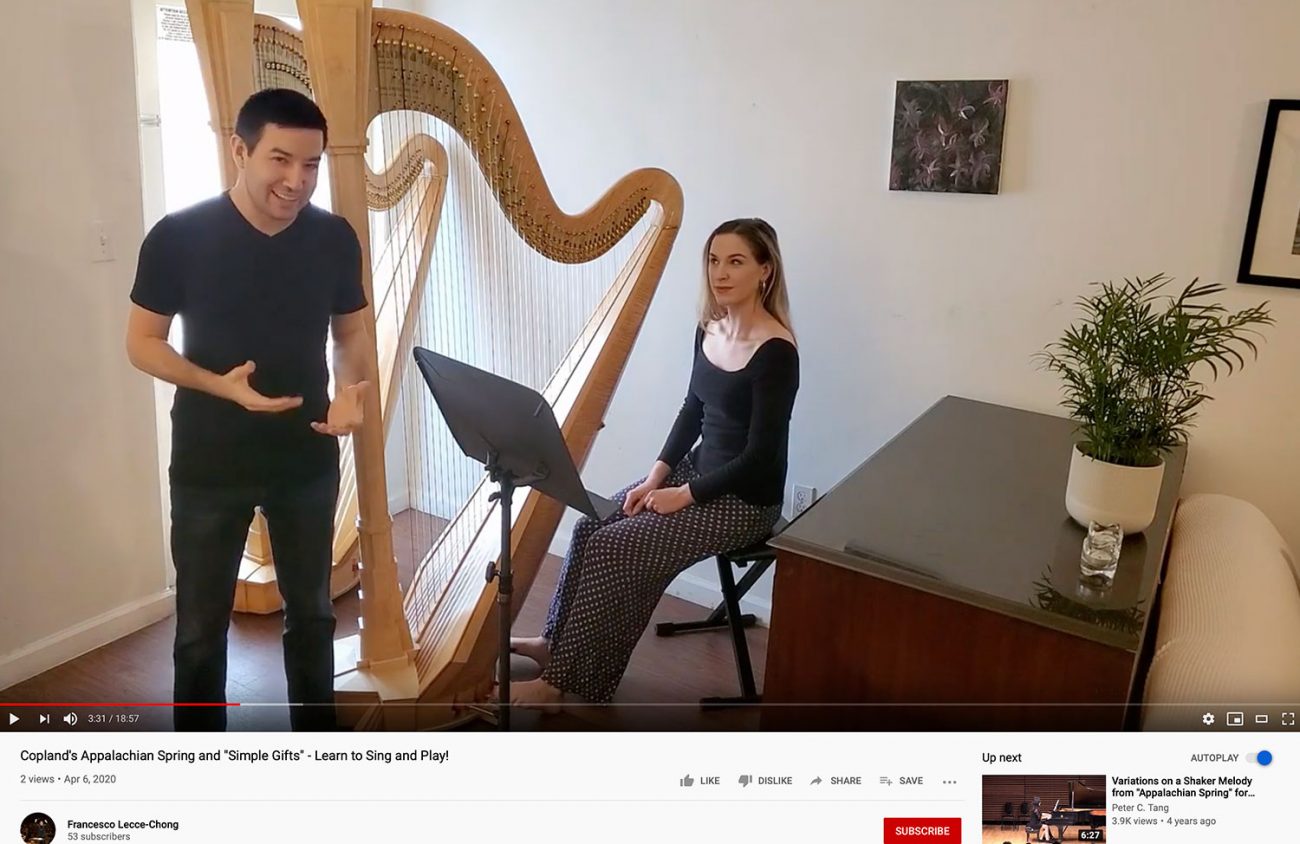Francesco Lecce-Chong got stuck in quarantine earlier than most people. About three weeks ago, after flying back and forth from Miami Beach, Florida, where he lives with his fiancée, to Eugene, he had to self-isolate himself, following orders from his apartment building. He had made the cross-country trip twice because social distancing measures had forced Eugene Symphony to postpone a concert.
The Eugene Symphony conductor and music director took the self-quarantining as a chance to make music education videos with his fiancée, Chloe Tula, principal harpist with the New World Symphony, and curate live classical music performances, allowing him to connect with patrons in Eugene and Santa Rosa, where he conducts part time.
“I was inside all the time and going crazy,” he says. “I fully admit a good portion of this is for my own sanity. Just to feel like I’m still working, connecting with people and keeping some sort of community with our art form.”
He doesn’t have a piano where he’s living now in Miami Beach, and it’s driving him crazy, he says. But he does have two harps — one belongs to a local orchestra and the other to Tula.
The education part of his online videos emerged because Eugene Symphony had plans for a concert with local Eugene-Springfield students, which is part of Link Up: The Orchestra Sings, an elementary music program through Carnegie Hall’s Weill Music Institute.
“Not only are these kids not getting to hear the orchestra, but they did all this prep work and can’t do anything with it and they’re stuck at home,” he says. “So they’re not getting any sort of arts education at all.”
He adds that he originally wanted to send the videos to teachers who were involved in the program, but now it’s for everyone.
The educational videos premiere 10 am (Pacific) Mondays on the Eugene Symphony Association’s Facebook page and are then posted on YouTube. During a typical video, Lecce-Chong shows students live performances of the song they’re learning to play. Tula introduces the melody to the theme on the harp. When it’s time for the duet between her and the student, she plays a fuller part, allowing the viewer to shine on the melody. And on Monday, April 13, viewers can explore the harp and how it’s played.
Lecce-Chong says he envisions the educational aspect broadening to include explaining musical topics such as theme variation, sonata form and rondo. But the current videos are for students who may be in their first year of studying an instrument.
“It’s a chance for them to be like, ‘Hey, there’s music on the screen; I can play along with that,’” he says. “We’ve got some great notes from parents.”
On Wednesdays, Lecce-Chong has family concert watch parties, which have so far included George Gershwin’s Cuban Overture, Aaron Copland’s “Lincoln Portrait” and Sergei Prokofiev’s Peter and the Wolf.
A lot of Eugene Symphony patrons are older, most at-risk for COVID-19. So Lecce-Chong’s watch parties are a way for him to curate previously recorded live performances, helping people navigate through the sea of classical music online.
“For musicians, we take it for granted,” he says. “I know which conductors and which orchestras I like. But I realize there’s a lot of people who if that’s not your expertise, you’re overwhelmed by the options.”
Lecce-Chong says he’s excited to drop a gem he’s recently found of a previously recorded live Beethoven’s Ninth Symphony performance (he’s already told me the conductor, but you’re going to have to wait and see what the surprise is).
The watch parties begin much like a Eugene Symphony concert does: Lecce-Chong talks about the composition’s context and the composer. There’s a difference, though. He says he’s able to connect with viewers who interact during the watch parties, something he can’t do if someone were to comment while introducing a piece at the Eugene Symphony.
And that’s sort of a silver lining to these stay-at-home orders, he says.
“There will be this incredible connection between audiences and their performers,” he says. “We’ll have spent all this time in each other’s private spaces, interacting and connecting and reminding ourselves why we need this.”
When concerts return to their music halls, it’ll be more than just hearing Beethoven again, he adds. Audience members will have a connection to the musicians on stage.
Francesco Lecce-Chong’s Monday educational videos are broadcast on the Eugene Symphony Association Facebook page. On his public conductor page, he has his 5 pm (Pacific) watch parties: Classic Tuesdays, Family Wednesdays, Quirky Thursdays and Epic Fridays. All videos are archived on his YouTube page.
